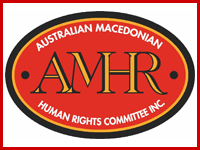by David Edenden
The minority rights policy of Greece is designed to wipe ethnic Macedonians off the face of the map. By definition, this policy is also the policy of the EU and Nato since Greece is a member , in good standing of both organisations. Greek values = EU/Nato values.
The EU/Nato response to the ICC ruling on the Macedonian Name Farce destabilizes Southeast Europe since minorities have no recourse for appeal against racist and sectarian assault in their country by the majority.
There's the rub!
MHRMI - Press Release AMHRC/MHRMI/Vinozhito Doubly Question The Appointment Of A 'Crusading' EU Special Representative For Human Rights July 30, 2012 |
 The Australian Macedonian Human Rights Committee (AMHRC), Macedonian Human Rights Movement International (MHRMI) and the European Free Alliance – Rainbow/Vinozhito, a political party of the Macedonian minority of Greece, questions the wisdom of a Special Representative for Human Rights to focus on non-EU states and is deeply concerned about the appointment of Stavros Lambrinidis to this post. On 25 June 2012, the EU High Representative of the Union for Foreign Affairs & Security Policy, Catherine Ashton, announced that former PASOK Foreign Minister of Greece, Stavros Lambrinidis will be the inaugural Special Representative. The appointment of a Special Representative for Human Rights follows the EU’s adoption in June of the Strategic Framework and the Action Plan on Human Rights and Democracy for the purpose of dealing with the EU’s external relations i.e. with third countries. In principle, any initiative addressing the promotion of human rights and democracy should be welcomed. However the limited scope of this plan is disappointing. Regrettably, it appears that the Special Representative won’t possess a mandate to address human rights violations and concerns within EU Member States. This is a missed opportunity to strengthen human rights protection within the Union, especially in relation to persistent human rights violators such as Greece, Bulgaria, Romania and Hungary. As Mark Dawson, Professor of Law at the Hertie School of Governance, has observed: "These violations can only be tackled, however, if an EU envoy is given the necessary powers. Existing EU human rights bodies—such as the European Union Agency for Fundamental Rights—have struggled to live up to expectations precisely because they have been given a highly limited mandate, able to provide “information” but not to critically and independently assess the conformity of national and EU institutions with human rights standards. The new special representative's ability to make a difference will depend on going further: this representative should not just be an external voice for human rights but should be given internal powers too, for example the ability to scrutinize legislation or even recommend legal measures against states who persistently act in violation of the EU Charter. To be a credible "external" actor, the EU must also be credible in terms of its own human rights commitments." In the programmatic statement of the EU Framework for the Promotion of Human Rights and Democracy, it is asserted that the EU will: “intensify the promotion of ratification and effective implementation of key international human rights treaties”. Yet it is the Greece of Mr. Lambrinidis, which is not a “third country”, but a foundation member of the ‘crusading’ EU, that has refused to ratify essential human rights instruments. The appointment of Mr Lambrinidis to this post has tarnished the office of the Special Representative even before work has commenced. Mr Lambrinidis is a former Foreign Minister of Greece and diplomat in the Greek Ministry of Foreign Affairs. Under his leadership the Greek Foreign Ministry continued to vehemently deny the existence of Macedonian, Turkish, Vlach and other minorities within Greece. The treatment of these minority groups has been heavily criticised by the United Nations’ Independent Expert on Minority Issues, various bodies of the Council of Europe and by domestic and international human rights organisations. Prior to becoming Foreign Minister, from 2004-2011 Mr Lambrinidis was a member of the European Parliament elected from the ranks of the PASOK party. He remained silent on the issue of minorities in Greece and in particular, in concert with fellow Greek MEPs, continued to deny the existence of Macedonian minorities in the Balkans. Mr Lambrinidis’ profile and record demonstrate that he is unfit for the position of EU Special Representative of Human Rights, even if the position has an international (non-EU) focus. There are a number of very fine human rights advocates in Greece; however, Mr. Lambrinidis cannot be counted as one of them. ### Macedonian Human Rights Movement International (MHRMI) has been active on human and national rights issues for Macedonians and other oppressed peoples since 1986. For more information: www.mhrmi.org,twitter.com/mhrmi, facebook, info@mhrmi.org, 1-416-850-7125. Established in 1984 the Australian Macedonian Human Rights Committee (AMHRC) is a non governmental organisation that advocates before governments, international institutions and broader communities about combating discrimination and promoting basic human rights. Our aspiration is to ensure that Macedonian communities and other excluded groups throughout the world are recognised, respected and afforded equitable treatment. For more information please visit www.macedonianhr.org.au, or contact AMHRC by email info@macedonianhr.org.au or via +61 3 93298960. The European Free Alliance – Rainbow is the political party of the Macedonian minority in Greece. The party has offices in Florina/Lerin and Edessa/Voden. For more information please visit www.vinozito.gr, or by email: vinozito@otenet.gr or on +30 23850 46548. |



No comments:
Post a Comment